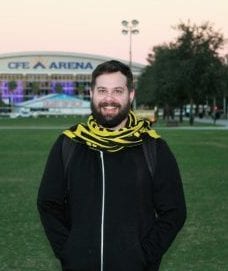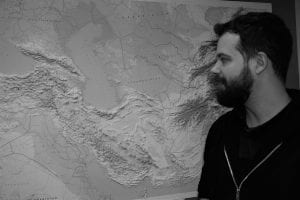From Coast to Mountains
December 11, 2017
Clayton Besaw, a PhD candidate in the Security Studies Program, is starting a full-time position as a Political Event Forecaster in One Earth Future based in Denver in few days. Clayton is also a member of the Research Group of the Kurdish Political Studies Program (KPSP). Before he embarks on his car journey from Orlando to Denver, we have caught up with Clayton to talk about his journey at UCF. Clayton will be back to UCF to defend his dissertation in spring 2018.

Clayton, you will be leaving Orlando after a long time; you were born in this area, you went to high school here, you attended UCF for your BA degree and your MA degree in Political Science and you will be graduating with a Ph.D. in Security Studies in Spring 2018. Do you want to tell us about how you get interested in pursuing a PhD in Security Studies?
Sure. Since 9/11, I was always interested in the question of why would someone engage in such kind of violence. So I chose Political Science as my undergraduate major at UCF. Yet I didn’t know how to combine this interest with a scientific enterprise. I was enrolled in the MA program knowing that this would be something more focused on research. There was a bit of struggle at first, but with the help of Dr. Thomas Dolan and Dr. Mark Schafer, I really started to put the puzzle pieces together and figured out how I could combine this interest and fascination in terrorism, and political violence generally, with a structured scientific research process. Towards the end of the MA program, I decided to pursue this interest further. I wanted to approach to the study of political violence from the perspectives of behavioral economics and political psychology. The presence of faculty members with similar interests has made UCF’s newly established Security Studies Program a good fit for me.
You are writing a dissertation which is utilizing the notion of altruistic punishments to explain why ordinary people take action against other people whom they perceive as harming their own group despite personal costs of this action. Do you want to tell us about your dissertation project?
My dissertation studies the decision to support political violence or active participation in a rebellion. It is primarily composed of a series of survey experiments. It is neither ethical nor feasible to do behavioral experiments with people who may be about to join a violent organization. There is a host of problems; people may feel shame if they actually do it; they may report false feelings; they may be afraid to talk about these things openly for fear of their governments or the FBI listening to them. Hence, I generate hypothetical scenarios about different types of intergroup conflict with enough substance to make them appear relevant and realistic to the respondents. In some experiments, I assess the impact of group identities based on partisanship on the decision to hurt an out-group member perceived to harm an in-group member. In other experiments, I ask participants in the United States and Germany to evaluate the decision of a hypothetical member of their community who has decided join a militia or a violent political organization during the current conflicts in the Middle East. I then examine how emotions central to altruistic punishment theory such as anger change participants’ evaluations.
You recently traveled to Germany to conduct some research among the Kurdish diaspora. How did you get more interested in Kurdish issues/politics?
It is twofold. First, asking Dr. Güneş Murat Tezcür to be a part of my dissertation committee really opened that door. Given the political history of the Kurdish people, it has made natural sense to include them in a study about altruistic punishment. Next, it is difficult to make universal claims about human behavior, what drives our reactions at the base level according to altruistic punishment, without having additional ethnic groups, religious groups, communities included in the research sample. This is especially important because the Kurds are much more closely tied to ongoing conflicts. They encounter the issues I study at a daily basis. In fact, I have found significant differences regarding how different populations respond to my survey experiments. Among U.S. populations, I am not finding real meaningful differences regarding their support for risky behavior with a personal cost. In contrast, there is a clear and significant difference among the Kurdish participants.

It is often said, “Kurdish people have been born into the politics.” Do you think this cliché came true in your empirical work?
Yes. For instance, in my face-to-face conversations with Kurdish individuals in Germany, this was a very recurrent theme across many different types of people, leftist, rightist, religious, non-religious. They all have a very strong sense of being member of a political community. They do not have a choice but to have political lives and engagements. Because if they do not, many of them believe it means the end of their people.
You recently told us about your study among the Kurds in Germany that “maybe for the first time I actually feel that I am studying politics.” Do you want to elaborate on this?
A lot of my research involves quantitative methods that analyze human behavior without direct focus on the thought-processes, beliefs, and emotions of individuals. We often we study things as insurgency and terrorism at the macro and group levels. When I went to Bremen I had the opportunity to really sit down and talk with some people who were taking my surveys. Many times I did not ask anything, they volunteered to tell me their thoughts about the conflict and asked me what I thought. Interacting with people who were involved politically in both violent and non-violent sense was really something new to me. I felt that was actually getting closer to something that we often take for granted in quantitative studies and macro level approaches. By talking to Kurdish participants about why they support certain political actions, I really felt that I was getting at that intersection of politics and psychology that is not possible otherwise.
That is very interesting because it basically shows that what you do has a real-life relevance.
Exactly, my experience reminds that I am not studying just points in a dataset, but real people!
Thank you very much for talking to us.
Clayton thanks Firat Esmer for his great hospitability in Bremen. KPSP thanks Helin Yıldız, a visiting MA student from the University of Bologna, for the transcription of this interview.
